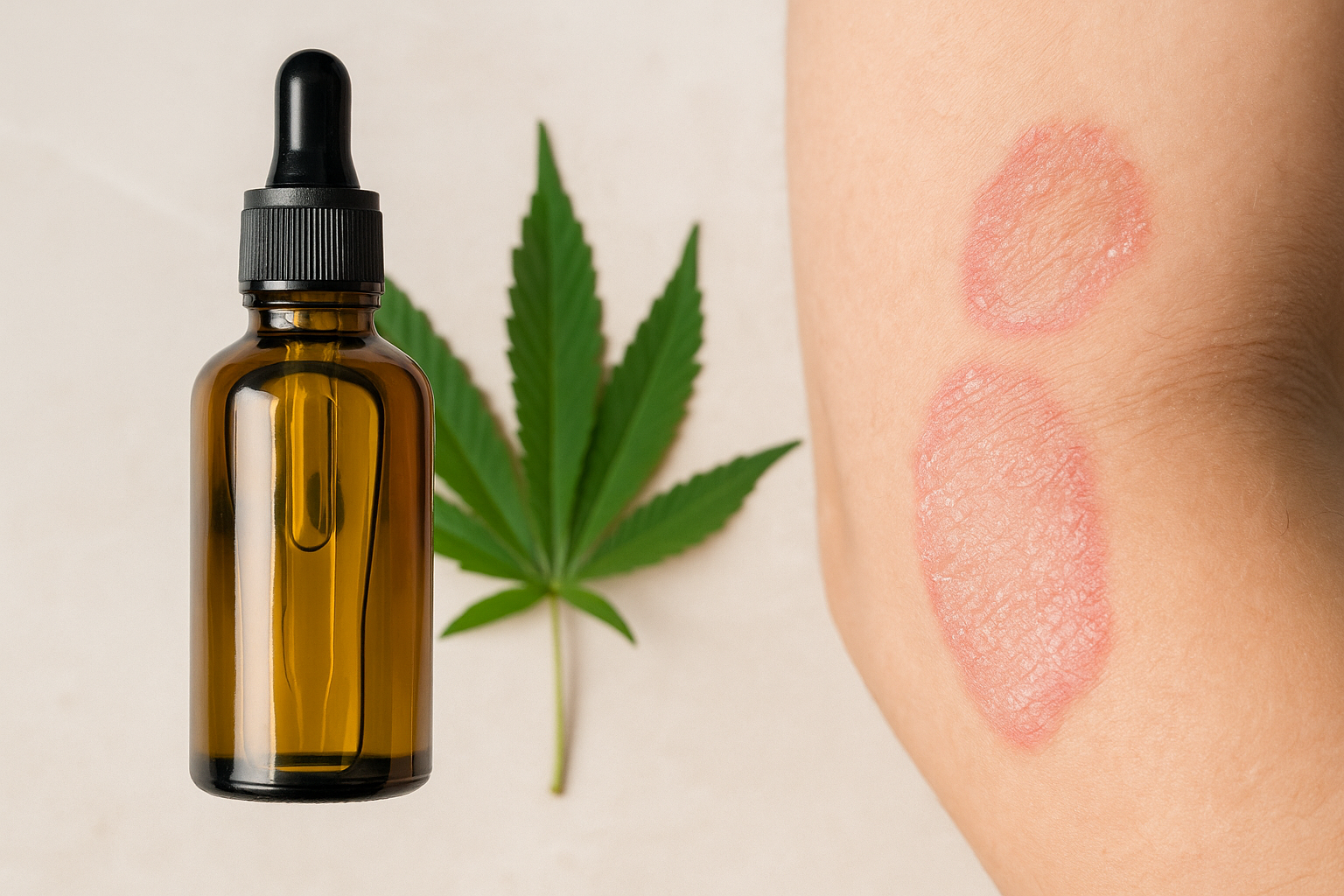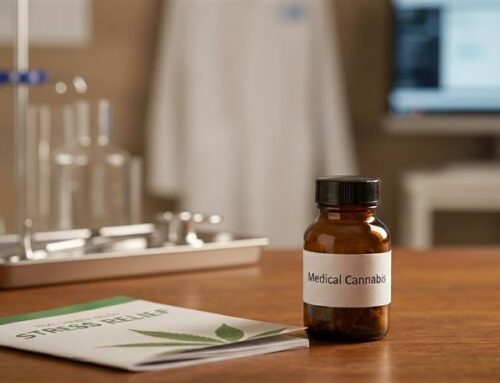Psoriasis impacts millions globally and is regarded as an autoimmune disorder characterized by chronic inflammation. It surfaced in the skin as redness with scaly patches, a hallmark of an increasingly complicated skin condition. Psoriasis, while not infectious, is nevertheless a sore, painful, and isolating disorder. The conventional therapy for this disorder includes topical and ingestible medicines, as well as phototherapy. It is with this background that more and more people are considering CBD for Psoriasis as a natural remedy.
This article will discuss the various symptoms, potential benefits, and side effects that one is likely to encounter while using CBD for Psoriasis.
What is CBD Oil?
CBD, short for Cannabidiol, has been gaining notoriety for its many health benefits, including, but not limited to, anxiety and chronic pain relief, and promoting a calming effect. Alongside the multitude of health benefits, Cannabidiol is a constituent of Cannabis sativa. It has come a long way to gather attention. Cannabis does possess a psychoactive component known as THC, which does result in a mental “high”. CBD for Psoriasis: Modulation of the Endocannabinoid System (ECS), which is responsible for immune and inflammatory responses, works for Psoriasis.
CBD’s most potent and defining characteristics are its capacity to provoke an immune response as well as its ability to calm and calm the immune system, synergistically controlling the inflammation for a psoriasis flare-up. This is most likely how CBD products can be of assistance.
How Can CBD Help With Psoriasis?
Using Cannabidiol or CBD for psoriasis works, let’s say new-age terrace-level CBD for psoriasis works, as it tries to balance the newly understood immune response and inflammation system. Screaming skin and Autoimmune skin disease patients are incredibly fragile. CBD products have anti-inflammatory properties that work when triggered by inflammation. That’s why CBD products of all types are the most sought after for the treatment of skin flare-ups. Balance rule – CBD controls the amount of skin cells being produced. That is good for the skin. Just as important.
Why Using CBD For Psoriasis Might Be Beneficial.
Here are five key measures to soothe your skin with e-government on exposed areas, featuring the We Smoother Looks Bright from CBD Focus Set Products.
Reduction of inflammation: Organically growing acne can often arise, crusted over with a top layer of dry skin sloughing over the top of pustules. CBD is an effective treatment for acne because of its anti-inflammatory properties, which allow for relief in redness and swelling during flare-ups. It also helps the skin’s ECS by preventing an inflammation overreaction, which keeps the skin in better shape and the flare-ups at bay.
Reduction of skin irritation: The CBD treatment, while psoriatic, is invaluable due to the uncontrollable and irritating itches associated with flare-ups. CBD for Psoriasis works in part due to the anti-inflammatory properties, which help soothe the skin itself and the scratching response. The goal is to minimize further damage to the skin by keeping the irritated zones scratch-free.
Regulates Cell Proliferation: Psoriasis is a pathological process characterized by the excessive accumulation of skin cells on the cellular surface, leading to the formation of scales and abnormal skin structural damage. Overturned cellular turnover rates can be compensated for by regulating tissue homeostasis with a more balanced skin turnover rate through the use of Cannabidiol. Fewer plaques and skin patches that are clinically or visibly apparent can be positively correlated with Cannabidiol use for Psoriasis.
Moderates Immune Responses: Psoriasis is a prevalent autoimmune disease. Psoriasis is the manifestation of an abnormal and hostile autoimmune phenomenon where the immune system targets healthy skin cells. The use of immunoregulatory Cannabidiol for Psoriasis can inhibit the excessive immunoreactivity that results in flare-ups. The holistic immune support can enhance the condition’s long-term management through the use of Cannabidiol.
Psoriatic Arthritis Potential Treatment: Psoriatic arthritis affects countless individuals who have Psoriasis. Joint inflammation and pain, Psoriasis, and CBD’s potential anti-inflammatory relief for Psoriasis may extend to psoriatic arthritis. Alleviating pain and improving joint mobility, and anti-inflammatory properties, and fundamental relief to individuals suffering from skin manifestations and joint ailments.
Using CBD For Psoriasis: Topical Application
Psoriasis has several options of CBD balms, lotions, and creams, all of which can be applied quickly and soothe inflammation and soreness. CBD-infused lotions can calm and hydrate patchy and fissured Psoriasis, restore skin barrier function, and are adjuncts to psoriasis therapy.
There is enhanced therapeutic efficacy with full-spectrum CBD oil when paired with synergistic terpenes and cannabinoids, which significantly aids the restorative process. This promotes skin health and wellness while also enhancing patient comfort.
Psoriasis patches are greatly diminished with topical CBD oil, which provides therapeutic relief when used alongside other combined modalities for the patient.
Adverse Effects of CBD
While most users have little to no adverse effects when using CBD, prescription drugs of any kind may have side effects, particularly when overdosed. When used as an adjunctive therapy for Psoriasis, some of the most common side effects associated with CBD are as follows.
Fatigue: Drowsiness, nap-like experiences, and sleep-related issues are rather common side effects of CBD. Drowsiness may be more pervasive in those users abusing a more sedating and hypnotogenic formulation, and over time, seems to become tolerated in most users to a degree.
Xerostomia: Xerostomia is also referred to as dry mouth, is a phenomenon that can be alleviated by drinking water.
Weight Gain: Fluctuations in weight and appetite are familiar with any peripheral-acting anti-obesity medication, and CBD is no exception.
Patient Medical Considerations: Usage of CBD may elicit adverse effects such as abdominal cramping, constipation, or, in some circumstances, even diarrhea, particularly in higher amounts.
The phenomenon of side effects tends to be mild and is usually transitory. However, in any context or frame of reference, if there is evidence of exceedingly severe side effects or some reaction that may border on discomfort, it is necessary to consult qualified medical expertise. Additionally, it is advised to avoid tainted products or those one may prefer to avoid, so it is better to utilize a premium CBD product from vetted, verifiable suppliers.
Will CBD Oil Work With Other Oils?
CBD has the ability to affect other medications that undergo hepatic metabolism. If a prescription is approved for Psoriasis or any other condition, the practitioner is required to explain the application of CBD for Psoriasis. The clinician is required to assess the extent to which prescription medications could interact with CBD and determine their usable or effective doses.
This is of utmost importance for people on immunosuppressive therapy or people with liver disease. Given that CBD is capable of altering liver metabolizing enzymes, there is no choice but to be conservative and discuss the use of CBD with a clinician in the case of first use.
Looking Ahead: Use of CBD for Psoriasis
Many people have just started using CBD for Psoriasis, and this has led to a need for stronger, more effective, and safer trials for long-term consumption. The use of CBD products for Psoriasis has started to be recognized by the National Psoriasis Foundation. However, related caution and the need to be purposeful in its consumption are still urged.
Conclusion
CBD-infused hemp oil and creams assist Psoriasis patients in relieving the inflammation and soreness associated with psoriatic plaques. Psoriasis oil, however, does not bring about a cure. It is a treatment aimed primarily towards the control of flare-ups.
Achieving an improvement in the quality of life is paramount, however. For the majority, life is unfortunately brief when suffering from Psoriasis. In the event that any external therapeutic intervention is warranted, the physician’s assistance is imperative. Most external therapies work in harmony with any treatment; however, it cannot be overemphasized that the importance of outlining all possible synergies.





